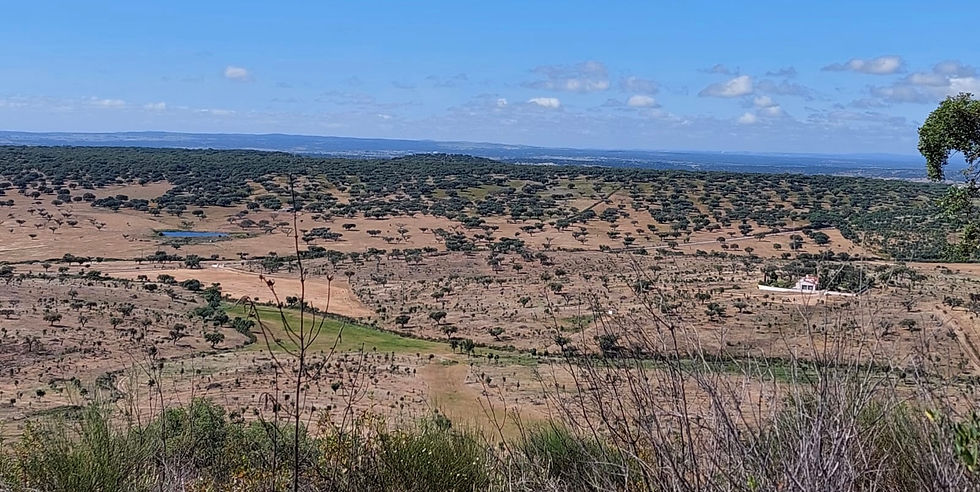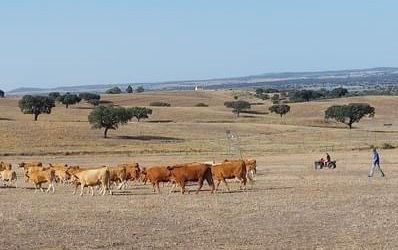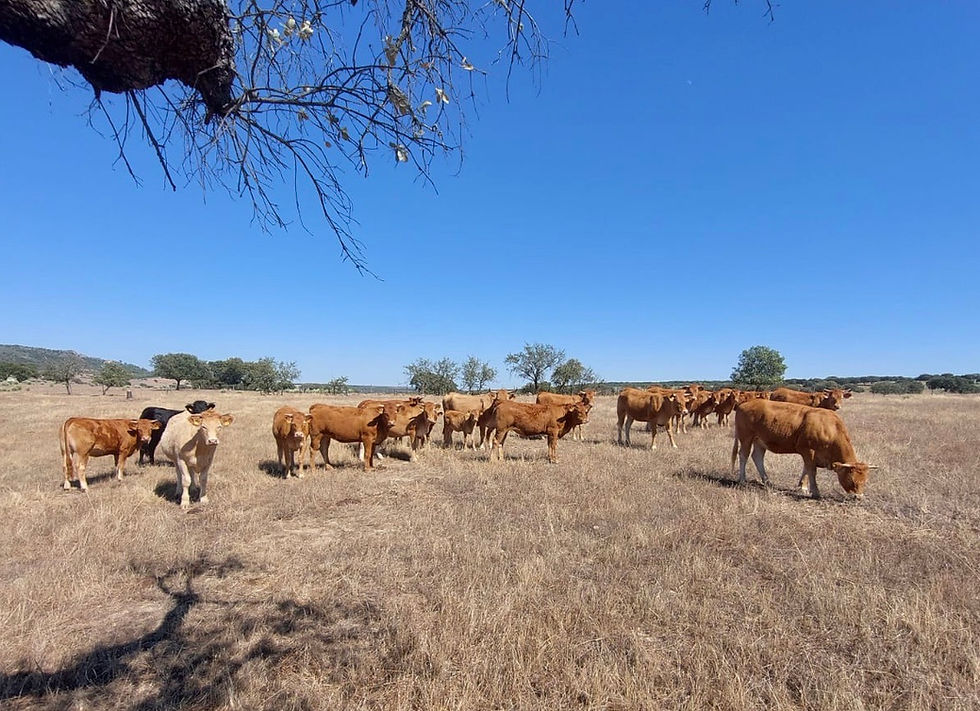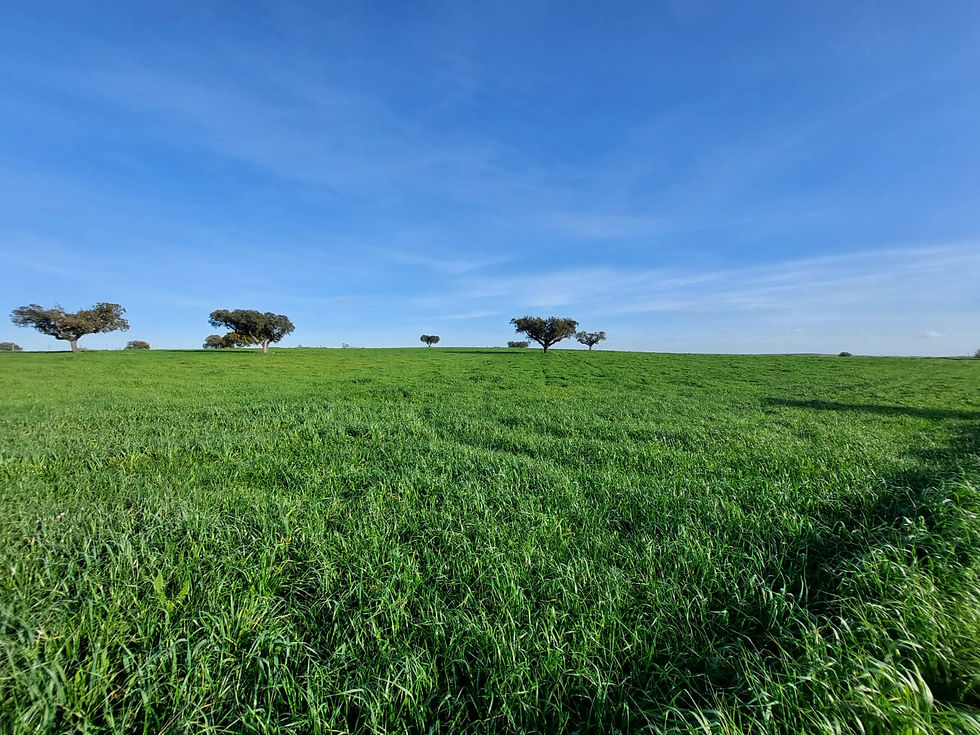
Campo Maior
Last week, Rozanne, John Tidey and his wife Margaret, and I took a trip to visit their nephew, Thomas, his mother, Sarah and his sister Joana, the Pickard family, who farm in Campo Maior in the Alentejo. The place is about fifty kilometres northeast of Evora, which I would consider the area in Portugal most similar to our commercial farms in Zimbabwe, growing cereals and, more recently, vast areas of plantation crops from olives to the in-vogue almond under irrigation.

Their farm is right on the Spanish border, some two and a half hours drive southeast of us. Along with the Algarve and neighbouring Spain, this area has been in the grips of an extended drought. On arrival there, the countryside reminded me quite a lot of the Lowveld, except the trees outside of the plantations are mostly cork oak. Many farmers run cattle and sheep but are not called ranchers here, although the cattle herders are called campinos, have seriously reduced their cattle numbers as the grazing has depleted. Fodder prices have gone from €70 a tonne to in excess of €300. Luckily, the Pickards have been prudent and smart and have a fodder bank, wise heads on young shoulders. The mother, son and daughter run the place, although the daughter is still studying. They do not supplement feed their cattle with licks or cubes; the cattle obtain all they need from the natural legumes and grains in the fodder and its residue left in the fields. The grasses are undersown with cereals such as oats, while the clovers and other legumes are endemic. Thomas informed me there were many legumes even in the rough, uncultivated grazing land. All their cultivated land is rainfed, and crops are grown explicitly for fodder, not grain. I was amazed at how well the cattle looked on the stubble; it reminded me of cattle on maize stover at home in Zimbabwe. Equally, the lush green of the photos I saw reminded me of the Lowveld, where cattle thrive once the rains arrive. The average size of the cows I saw was about five hundred kilograms, not far from the size we preferred. Thomas said that was the optimum size; any bigger became too expensive to keep. The cows we saw were from indigenous breeds crossed with Limousin. Further, the family has access to the grass between the trees in nearby almond plantations. Being good neighbours always pays off. The plantation owner has a tidy plantation for free while the family get the grass for the cattle, a good symbiosis. They have geared themselves up with the right equipment to do this; Thomas travelling as far as France to get good second-hand hay-making equipment at a reasonable price. I think I will chat about almonds and other plantation crops next week.

Thomas has studied agriculture and had hoped to spend some time in Australia broadening his farming knowledge, but unfortunately, his presence is required on the farm. He is looking to expand his fodder business, which, when he gets access to other plantations, will allow him to expand his livestock farming enterprise without the capital cost of land. He is even looking at large plantations across the border in Spain, very enterprising.
Visiting the farms and walking among the cattle was so enjoyable. Our enjoyment was improved by the excellent steaks served at a local restaurant that evening. Luckily, on advice, we shared one steak between three. Cooked perfectly on the charcoal grill. Who said you cannot get good steaks in Portugal?
Choice
Personal discussions stay in 'house' on our odd cigar and wine Sunday evenings get-together. This means you can say what you like without fear or favour, especially in regard to race, religion, sex and gender. Having an opinion and voicing such in public can now be construed as a crime in some countries, depending on how much the government or police in that country have bought into or, even worse, been intimidated by wokism. The individual, especially if a public figure, can be cancelled, but I will come back to wokism in a minute after I discuss the first subject, not controversial, however, discussed on Sunday night.
We unanimously agreed that we were fortunate to be living in Portugal. Being old much of our conversation is about the past, not the future, as we have no fear of at our age. So in agreeing to be lucky in Portugal, we decided it had been a good choice to come here. I caught onto the word choice and said it appeared to me we were double lucky in having been able to make a choice. Due to birth, circumstance or nature, many people do not have the pleasure of having a choice, let alone making the right one.
“Just having the access to choice and the ability to exercise it is something many are not lucky enough to have. Only when you travel, be it just outside your community let alone country, do you realise the majority of people, even if they had or wanted a choice, cannot do so due to force of circumstance.” - Peter McSporran
Making the right choice in life is generally something you can only look back at the same as with reviewing your lousy choices. Most options when you make them, you think are good or right at the time. Only in the future, with hindsight, can you safely say if they were or not. Some choices are always wrong; those made out of malice, greed or revenge, for instance, are rarely right, although some personal pleasure may be gained from them at the time. From my experience in later life, those choices give one little pleasure to reflect on, may even instigate guilt, one of life’s most onerous burdens.

The three ingredients that enhance choice are circumstance, opportunity and, of course, luck. That is, you have to be in the right place when the opportunity arises, and while you may analyse and debate your reasons for doing so, it does not do harm knowing that lady luck was on your side.
“We can boast that through good forethought we made the right choices but never forget often the opportunity comes about by being lucky enough to be in the right place and right time when the opportunity arises.” - Peter McSporran
There is no doubt in a number of instances in my life, this is true. Many may say I was able to make the choice as my hard work enabled me to do so, I agree, but for success, hard work or at least a willingness to take risks in business or private life is a given.
“A person may be a natural athlete and choose to become a professional. Only with hard work on top of his choice will he or she become successful.” - Peter McSporran
So choice is only part of succeeding, but have you thought how it must be to not have that choice? Then there is the other side of the coin: you do things because you have no other choice. No opportunity. Often, what is seen by others as a wrong choice in fact, was the only option open to that individual, and therefore, they should be afforded some sympathy. The exceptions are those who make bad choices for greed under the guise of circumstance. I have little sympathy for them.

We did not discuss choices on Sunday other than agreeing we were all lucky we had access to choices and generally had made the best ones, allowing us to live out our retirement in comparative comfort. Hence, our weekly enjoyment of a glass of wine and a cigar. As John Tidey does not smoke, we allow him to bite his nails while we do. It is his choice.
My three favourite teams are in the same pool in the Rugby World Cup. Now, that is a hard choice.
Now to wokism.
“And one thing I know all too well is that bullies are the types who get the most offended about the tiniest and most insignificant of things. Bullies are the very people who subscribe to this kind of tripe because they’re the type who love to make any error someone makes ten times bigger than what it is. Even worse, bullies constantly search, and search high and low, for anything…anything to blow up, be offended about, nitpick, and make out to be an unforgivable sin that you should be given a death sentence for.”- Cherie White
This, written by Cherie White, sums up what I have thought of wokism for a long time. It is small activist groups that wish to force their perceptions of race, gender and even the past onto the silent or at least well-behaved majority. They use the colour card because it is convenient, confuse sex and gender, and actively brings up the past to try and create a vulnerability through guilt. They say, “He or she was not chosen because of colour not lacking merit, your wealth is due to being a colonialist and exploiting the indigenous inhabitants; you or your country have benefited from your ancestors owning slaves,” and so it goes on, and finally I can choose what gender I want to be.
“My father's guilt or my brother's guilt is theirs alone; it is not mine, let alone that perceived of my ancestor's guilt. Having an opinion should not be a means to identify an individual's undeserved sense of guilt.” - Peter McSporran
The worst thing with wokism is that they want to bully you into not only not having your own opinion but rather adopting theirs as being the only acceptable one. This fact alone should make us stand up against these bullies; without an opinion, how can you make a choice?
Mede Farm Purchase
Following the death of my father-in-law, Derek Belinsky, in 1991, my sister-in-law became the benefactor of the trust that owned Mede farm on which I leased the arable land and Derek leased or rather used the grazing. She decided as she spent a lot of time overseas in the fashion industry, she would rather sell the farm and buy a property in Harare. In those days, you could not move your money out of Zimbabwe. I agreed I would consider buying it, and after independent valuation, she offered it to me and Diane, which we accepted. Obviously, you do not always have the funds capable of buying a farm in your back pocket, so it was off to the bank, who were happy to lend me the money to purchase the farm. We were able to do this on a short-term cash flow loan rather than a capital one; we had already long paid off Rydal and Diandra Farms. We did lodge the title deed with the bank but were never asked to sign it over as security. We, therefore, now owned three farms, unencumbered titles with access to an annual working capable loan. I managed this loan not against the value of the crops I would hope to sell but my cattle herd. In essence, my cattle were comfort for my loans; they could cover any working capital debt rather than the sale of fixed or movable assets. This method of money management gave me a great deal of flexibility, even allowing me to buy my feeders annually from the cash flow. I called my cattle my walking bank. Luckily enough, I never at any point had to sell cattle to support the crop cash flow. Cattle were also a great tax management tool with fixed values, normally only increased in poor cropping years.

I suppose it may have been an opportune time to buy as the country was now in the full throes of the 1991/92 drought. Not only were crops failing but even farmers with irrigation found their rivers had stopped flowing and their dams had dried up. We often asked ourselves will it ever rain again; global warming was unheard of at that time.
“It is nice when memories bring a smile to your face. If they do not, banish them from your mind.” - Peter McSporran
Disclaimer: Copyright Peter McSporran. The content in this blog represents my personal views and does not reflect corporate entities.
Comments